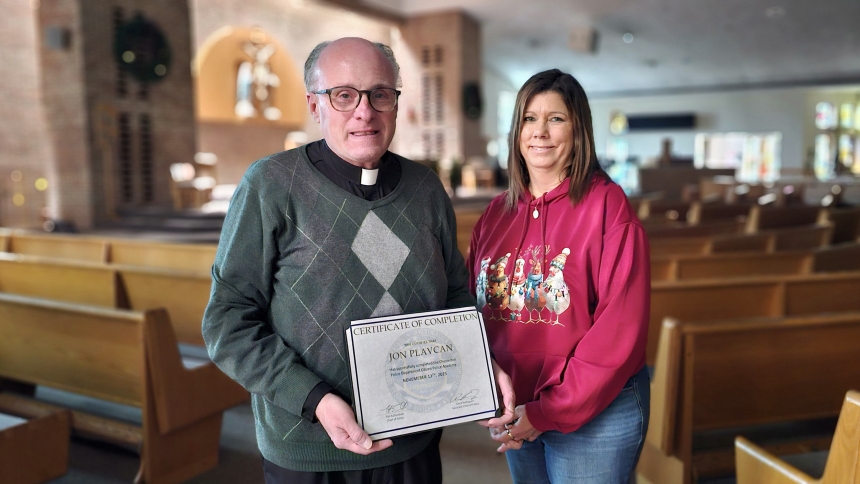
NEW YORK (OSV News) – The sober drama "It Ends With Us" (Columbia) takes on the grim problem of spousal abuse. While the film has its lighter moments, it also has defects that lessen its impact and moves toward a conclusion that requires careful assessment from a Catholic perspective.
As adapted from Colleen Hoover's bestselling 2016 novel, this is the story of Boston-based florist Lily Bloom (Blake Lively). Opening scenes show us that Lily had a conflicted relationship with her recently deceased father who, we eventually learn, was violent toward her mom, Jenny (Amy Morton).
Moving on with her life in the wake of dad's demise, Lily achieves her long-standing dream of opening her own flower shop. She also acquires a new best friend and business partner, Allysa (Jenny Slate).
Unbeknownst to either pal, Lily has already met Allysa's brother, neurosurgeon Ryle (Justin Baldoni, who also directed). After the duo, who previously shared a brief but intense chance meeting, are reintroduced by Allysa, Ryle begins pursuing Lily relentlessly.
Ryle is relationship averse but Lily, in her own words, doesn't "do casual." She wins that battle when Ryle agrees to start dating her. The pair move on to shacking up, then become engaged.
Lily's future prospects become complicated, however, as the result of two unexpected events. The first is an ambiguous incident involving Ryle that leaves her visibly injured. The other is her random reunion with her first love, Atlas (Brandon Sklenar). Once a homeless teen, Atlas is now a successful restaurateur.
Like Lily herself, Atlas grew up in an abusive environment since his mother was drawn to men who beat her. Based on this experience, he immediately suspects that Ryle intentionally caused Lily's wound, though Lily initially denies this.
As recounted in flashbacks, Lily and Atlas' history together is a morally equivocal one. Realizing the nature of Atlas' plight, Lily leaves food for him outside the abandoned building in which he's taken shelter and, when he later thanks her, preserves his dignity by claiming not to know what he's talking about. On the other hand, it's not long before their bond becomes a physical one.
Viewers will also have to exercise care in evaluating the ethical ins and outs of the movie's wrap-up. As charted by Christy Hall's screenplay, the upbeat ending doesn't necessarily strike the right balance between the necessity of separating for safety and the respect due to the permanence of marriage.
On a purely aesthetic level, there are flaws as well. The story is marred by unrealistic interactions and coincidences that strain credibility. Thus, while "It Ends With Us" is certainly a respectable work that tackles a regrettably widespread phenomenon in our society, its less than accurate reflection of life in the real world tends to hobble it.
The film contains mature themes, including domestic violence resulting in some gory images, premarital encounters and cohabitation, scenes of sensuality, partial nudity, a few uses of profanity, numerous milder oaths, about a dozen crude terms, a couple of crass expressions and an obscene gesture. The OSV News classification is A-III -- adults. The Motion Picture Association rating is PG-13 -- parents strongly cautioned. Some material may be inappropriate for children under 13.


